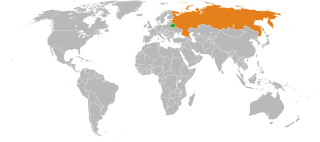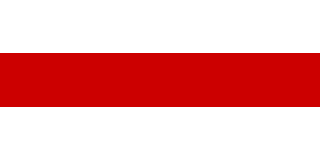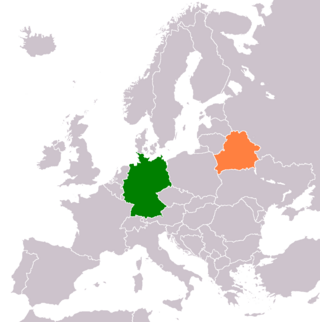| |||||
| Decades: | |||||
|---|---|---|---|---|---|
| See also: | |||||
| |||||
| Decades: | |||||
|---|---|---|---|---|---|
| See also: | |||||
Ongoing: Belarusian involvement in Russian invasion of Ukraine; Belarus–European Union border crisis

Belarus, officially the Republic of Belarus, is a landlocked country in Eastern Europe. It is bordered by Russia to the east and northeast, Ukraine to the south, Poland to the west, and Lithuania and Latvia to the northwest. Covering an area of 207,600 square kilometres (80,200 sq mi) and with a population of 9.1 million, Belarus is the 13th-largest and the 20th-most populous country in Europe. The country has a hemiboreal climate and is administratively divided into six regions. Minsk is the capital and largest city; it is administered separately as a city with special status.

The Armed Forces of the Republic of Belarus are the military forces of Belarus. It consists of the Ground Forces and the Air Force and Air Defence Forces, all under the command of the Ministry of Defence. As a landlocked country, Belarus has no navy, however the Belarusian military does have control over some small Soviet inherited naval vessels in its rivers and lakes.
The lands of Belarus during the Middle Ages became part of Kievan Rus' and were split between different principalities, including Polotsk, Turov, Vitebsk, and others. Following the Mongol invasions of the 13th century, these lands were absorbed by the Grand Duchy of Lithuania, which later was merged into the Polish–Lithuanian Commonwealth in the 16th century.
The mass media in Belarus consists of TV, radio, newspapers, magazines, cinema, and Internet-based websites/portals. The media is monopolized by the government, which owns all TV channels, most of the radio and print media. Broadcasting is mostly in Russian, and Russian media are widely present. After 2020, all independent media were pushed out of the country. The Law on Mass Media has been repeatedly amended and tightened, making it virtually impossible for independent journalists and publications to operate. European, Ukrainian and news websites were blocked in Belarus. The Constitution of Belarus guarantees freedom of speech, but this is contradicted in practice by repressive and restrictive laws. Arbitrary detention, arrests, and harassment of journalists are frequent in Belarus. Anti-extremism legislation targets independent journalism, including material considered unfavourable to the president. As of 2023, Belarus ranks 157th in the World Press Freedom Index. BBC describes the Belarusian media environment as one of the most repressive in Europe.

Alexander Grigoryevich Lukashenko is a Belarusian politician who has been the president of Belarus since the office's establishment in 1994. This makes him the longest-serving European president.

The state flag of Belarus is a red-green bicolour with a red-on-white ornament pattern placed at the hoist (staff) end. The current design was introduced in 2012 by the State Committee for Standardisation of the Republic of Belarus, and is adapted from a design approved in a May 1995 referendum. It is a modification of the 1951 flag used while the country was a republic of the Soviet Union. Changes made to the Soviet-era flag were the removal of communist symbols – the hammer and sickle and the red star – as well as the reversal of the colours in the ornament pattern. Since the 1995 referendum, several flags used by Belarusian government officials and agencies have been modelled on this national flag.

The Union State, or Union State of Russia and Belarus, is a supranational union consisting of Belarus and Russia, with the stated aim of deepening the relationship between the two states through integration in economic and defence policy. Originally, the Union State aimed to create a confederation; however, both countries currently retain their independence.

The Constitution of the Republic of Belarus is the ultimate law of Belarus. The Constitution is composed of a preamble and nine sections divided into 146 articles.

The president of the Republic of Belarus is the head of state and head of government of Belarus. The office was created in 1994 with the passing of the Constitution of Belarus by the Supreme Council. This replaced the office of Chairman of the Supreme Council as the head of state. The tasks of the president include executing foreign and domestic policy, defending the rights and general welfare of citizens and residents, and upholding the Constitution. The president is mandated by the Constitution to serve as a leader in the social affairs of the country and to act as its main representative abroad. The duties, responsibilities and other transitional clauses dealing with the presidency are listed in Chapter Three, Articles 79 through 89, of the Constitution.

Belarus and Russia share a land border and constitute the supranational Union State. Several treaties have been concluded between the two nations bilaterally. Russia is Belarus' largest and most important economic and political partner. Both are members of various international organizations, including the Commonwealth of Independent States, the Eurasian Economic Union, the Collective Security Treaty Organization, and the United Nations.

Belarus and Lithuania established diplomatic relations on 24 October 1991, shortly after the dissolution of the Soviet Union. The two countries share 680 kilometres (420 mi) of common border. Lithuania's border with Belarus is the country's longest border. For Belarus it is its 3rd-longest border.

The Belarusian opposition consists of groups and individuals in Belarus seeking to challenge, from 1988 to 1991, the authorities of Soviet Belarus, and since 1995, the leader of the country Alexander Lukashenko, whom supporters of the movement often consider to be a dictator. Supporters of the movement tend to call for a parliamentary democracy based on a Western model, with freedom of speech and political and religious pluralism.

The Rada of the Belarusian National Republic was the governing body of the Belarusian Democratic Republic. Since 1919, the Rada BNR has been in exile where it has preserved its existence among the Belarusian diaspora as an advocacy group promoting support to Belarusian independence and democracy in Belarus among Western policymakers. As of 2024, the Rada BNR is the oldest existing government in exile.

Sviatlana Hieorhiyeuna Tsikhanouskaya is a Belarusian political activist. After standing as a candidate in the 2020 presidential election against the president Alexander Lukashenko, she has led the political opposition to his authoritarian rule through an oppositional government operating from Lithuania and Poland.

The Coordination Council for the Transfer of Power is a non-governmental body created by presidential candidate Sviatlana Tsikhanouskaya to facilitate a democratic transfer of power in Belarus. The council, founded during the 2020 Belarusian protests in response to the disputed 2020 Belarusian presidential election, has 64 core members with a 7-member leadership presidium.

The Belarus–European Union border crisis was a migrant crisis in 2021 consisting of an influx of coordinated groups of immigrants, mostly from the Middle East and North Africa, to Poland, Lithuania and Latvia via those countries' borders with Belarus. The crisis was artificially caused by Belarus in response to the severe deterioration in Belarus–European Union relations, following the 2020 Belarusian presidential election, the 2020–2021 Belarusian protests, the Ryanair Flight 4978 hijacking and subsequent sanctions on Belarus, as well as the attempted forced repatriation of Olympic sprinter Krystsina Tsimanouskaya from Tokyo, Japan.

Belarus, a close ally of Russia, has supported its eastern neighbour in the Russian invasion of Ukraine. Before the start of the offensive, Belarus allowed the Russian Armed Forces to perform weeks-long military drills on its territory; however, the Russian troops did not exit the country after they were supposed to finish. Belarus allowed Russia to stage part of the invasion from its territory, giving Russia the shortest possible land route to Ukraine's capital, Kyiv. However, these forces withdrew within two months, thus ceasing land-based military operations originating from Belarus and resulting in the recapture of the Ukrainian side of the border region by Ukraine. Despite this, the situation along the border remains tense, with Ukraine closing the border checkpoints leading into Belarus, bar special cases.

Germany has an embassy in Minsk. Belarus has an embassy in Berlin, a consulate general in Munich, and two honorary consulates in Cottbus and Hamburg.
Parliamentary elections were held in Belarus on 25 February 2024. The country elected 110 deputies to the lower house of parliament and about 12,000 representatives of local councils.